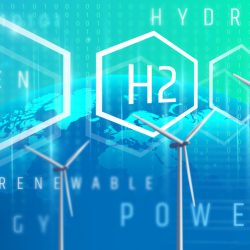If you’re paying attention to the news lately, the end of the fossil fuel economy seems nearer than ever. In the past few weeks, major shareholder initiatives, legal challenges lost, and changing consumer trends have shaken up boards, business models and executive pay schemes at Exxon Mobil Corp., Chevron Corp., and Royal Dutch Shell. Everyone, it seems, is demanding that these massive oil interests move away from business models reliant on fossil fuel extraction, clean up their carbon footprint, and own up to their outsized role in climate change. Meanwhile, the headlines are full of new Green Hydrogen plants being planned and built that rely on solar and wind resources to generate hydrogen from water.
In case your head has been spinning, and you feel like you need some background on what the future of energy might look like without the dominance of Big Oil, especially how this might actually lead to more employment, more national security, and more sustainable systems, we invite you to read this chapter from 2007’s Freedom from Middle East Oil. It’s a wonderful primer on the coming Hydrogen Revolution, though it was about a decade ahead of its time!
Chapter 12: Hydrogen Revolution: Growth, Jobs, Security & Sustainability
“The worldwide hydrogen energy web will be the next great technological, commercial, and social revolution in history.”
— Jeremy Rifkin, The Hydrogen Economy, 2003
Will the hydrogen fuel cell replace the internal combustion engine, and is it useful beyond transportation? Yes.
- The replacement could start to happen within 10 years, if we begin the transition to the new energy economy
- All major car manufacturers already have advanced hydrogen fuel cell programs
- The hydrogen fuel cell cleanly converts H2 + O2 into electricity + H2O, for vehicles, businesses, and homes.
- Critics view the challenges as hydrogen fuel cell cost, and hydrogen production, distribution, safety, and
The Hydrogen Racer
You may think that hydrogen power is some futuristic fantasy, fit only for science fiction writers like Jules Verne in his novel Mysterious Island. Or, at best you might consider it a viable technology that won’t be ready for prime time for another 40 to 50 years. if so, think again. in a special edition on “Best inventions 2006,” Time magazine praises the decision by shanghai-based Horizon Fuel Cell Technologies “to design and market the H-racer, a 6-inch-long toy car that does what Detroit still can’t. it runs on hydrogen extracted from plain tap water, using the solar-power hydrogen station.”
Hydrogen vehicles are not mere toys. There are thousands now on the road. A BMW prototype with a hydrogen internal combustion engine attained a top speed of 186 mph. Mazda, Ford, Honda, and GM are developing a variety of hydrogen-powered engines: fuel cell, internal combustion, and Wankel. Perhaps most exciting, Honda is now powering vehicles with hydrogen derived from tap water in small stationary units that drivers can keep in their garages…. (To read full chapter, click here)
Ch 12, The Hydrogen Revolution, Freedom from Mid-East Oil, 2007 (downloadable pdf)

